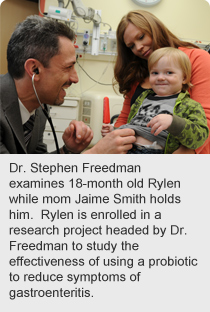
June 5, 2013
Story by Greg Harris; photo by Paul Rotzinger
Calgary mom Jaime Smith knows full well the toll that stomach flu can take on a toddler.
 Her 18-month-old son, Rylen, became ill earlier this spring and spent several days with fever, and bouts of diarrhea and vomiting.
Her 18-month-old son, Rylen, became ill earlier this spring and spent several days with fever, and bouts of diarrhea and vomiting.
“It’s really hard to see your child so sick,” she says of the experience. “After it went on for a few days, we started to get worried about dehydration, so we took him into Alberta Children’s Hospital.”
Rylen was diagnosed with gastroenteritis, or the common stomach flu, just like an estimated 5,000 - 6,000 other children who visit the emergency department at ACH each year. Unfortunately there is little doctors can do for kids with gastroenteritis except to make sure they’re well hydrated and try to minimize their symptoms.
But now, a physician at Alberta Children’s Hospital is leading a national research study that will examine the effectiveness of a probiotic in shortening the duration of gastroenteritis and reducing the severity of its symptoms.
The multi-centre study is the largest of its kind in North America and will test nearly 900 children ranging in age from three months to four years.
“The theory is that a probiotic agent may have the potential to calm the immune system, allowing it to focus on the infection – with minimal adverse effects to the child,” says Dr. Stephen Freedman, the principal investigator of the study and a member of the Alberta Health Services-University of Calgary Alberta Children’s Hospital Research Institute for Child and Maternal Health.
Probiotic is the term given for any live bacterial agent thought to have a beneficial effect. There are many commercially available probiotics that purport to treat a variety of conditions; some are marketed as healthy ingredients in foods such as yogurt.
Dr. Freedman’s study will look at the effectiveness of a specific probiotic called Lacidofil, which is a combination of two live bacteria strains that have shown promise as a treatment for gastroenteritis in both laboratory models and clinical trials.
Most cases of diarrhea in children are caused by a variety of viral infections that alter the secretion, absorption and movement of liquids in the intestines. Preliminary work with Lacidofil has shown that it reduces cell damage, prevents the viruses from binding to and invading the cells, and modulates the body’s immune response.
The study, expected to begin this fall and run for three years, follows a pilot project in Toronto and Calgary, in which more than 125 children were enrolled, about half from Calgary.
Smith was given the opportunity to enrol Rylen in the probiotics pilot when they visited the emergency department.
“I figured if having him in the study could help someone else down the road, then why not?” she says.
Although parents aren’t told whether their child receives the probiotic or a placebo, Smith says her son improved soon after the hospital visit.
Other sites participating in the study, which will begin later this year, include the Children’s Hospital of Eastern Ontario in Ottawa, CHU Sainte-Justine Mother and Child University Hospital Centre in Montreal, The Hospital for Sick Children in Toronto, and the IWK Health Centre in Halifax.